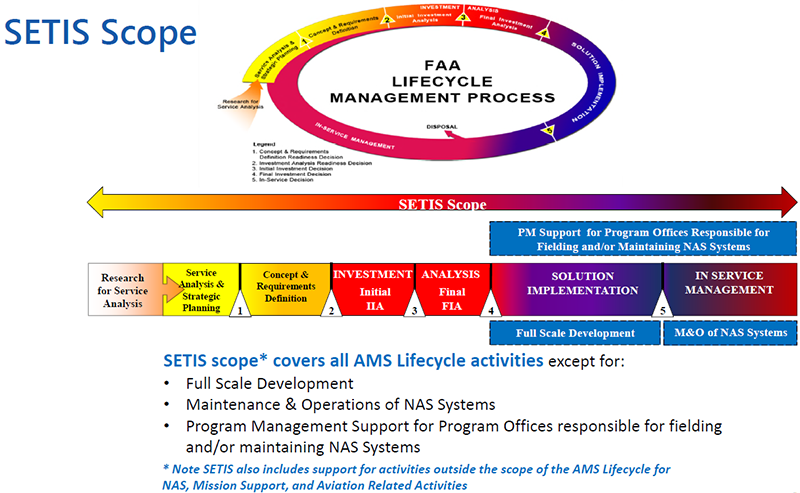SETIS - Scope of Contracts
Find out how to get started and what information to include in your initial request.
The scope of the SETIS portfolio consists of 37 Tasking Requirements. A Tasking Requirement is a task area by which a vendor may provide support services on a SETIS Task Order (TO). The SETIS Program Office reviews each TO early in the process to ensure all tasks relate to one or more Tasking Requirement as defined in the SETIS Statement of Work (Section C). The Tasking Requirements are listed below.
SETIS Tasking Requirements:
- System Engineering Management
- Innovation Support Services
- System Requirements and Definition
- Analysis, Design, and Integration
- Value Engineering
- Supportability, Maintainability, and Reliability Engineering
- Quality Assurance and Quality Control Program
- Configuration Management
- NAS and Mission Support Information Security (INFOSEC) Support
- Technical, Engineering, and Scientific Support
- System Safety Engineering and Management
- Other System Engineering Specialties
- NAS and Mission Support Enterprise Architecture Support
- Technology Opportunities Support
- Test Resources
- Lab Facilities
- Investment Portfolio Management
- Lifecycle, Earned Investment and Business Case Analyses
- Forecasting and Strategy Development
- Business Planning
- Performance Analysis
- NAS Modernization Information Technology (IT) Support
- Policy Studies
- Program Planning and Financial Management
- Program Management Support
- Program Management System Tools
- Information Systems Development and Maintenance
- Training
- Business Process Re-engineering (BPR)
- Aircraft Certification
- Software Engineering
- Verification & Validation (V&V) Program
- Horizon Scanning, Technology Scouting, and Market Analysis
- Demand for National Airspace System (NAS) Services Support
- Identified Projected Supply of Services
- Mission Needs Analysis & Assessment Support
- Future NAS Research & Development Portfolio Optimization
SETIS Core and Additional Capabilities
SETIS Scope relative to the AMS Lifecycle Management Process

